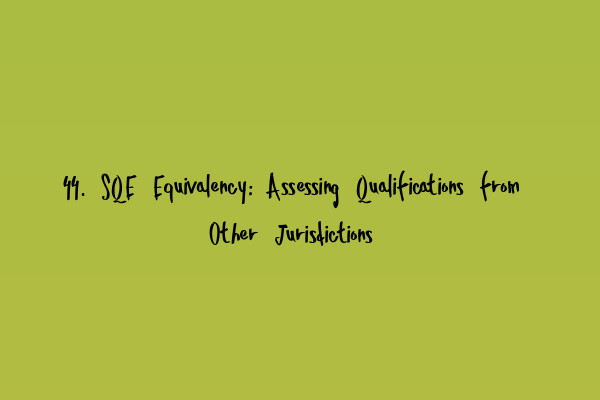44. SQE Equivalency: Assessing Qualifications from Other Jurisdictions
As aspiring solicitors prepare to take the Solicitors Qualifying Examination (SQE), it is essential for them to understand the process of assessing qualifications from other jurisdictions. The SQE, which is set to replace the current Qualifying Law Degree (QLD) and Legal Practice Course (LPC), aims to create a more streamlined and standardized path to qualifying as a solicitor in England and Wales. By assessing equivalencies, the SQE ensures that individuals who have obtained legal qualifications in other jurisdictions are given fair consideration.
Importance of Assessing Qualifications from Other Jurisdictions
The legal field is a diverse profession, and individuals from various backgrounds may seek to practice law in England and Wales. Whether they are foreign-trained lawyers or individuals who have completed their legal education in other jurisdictions, the SQE recognizes the value and relevance of their qualifications.
Assessing qualifications from other jurisdictions allows for a comprehensive evaluation of an individual’s legal knowledge and skills. It ensures that the SQE recognizes the competence and expertise of individuals who have already demonstrated their abilities in a different legal system.
Assessment Criteria
When assessing qualifications from other jurisdictions, the SQE takes into account various criteria to determine their equivalency. These criteria include:
- Educational Requirements: The SQE evaluates the academic rigor and depth of the legal education obtained in the specific jurisdiction. This includes assessing the duration, content, and quality of the legal qualifications.
- Professional Experience: In addition to the educational requirements, the SQE considers the professional experience gained by the individual in their jurisdiction. This experience provides valuable practical insights and enhances their legal skills.
- Core Subject Areas: The SQE compares the core subject areas covered in the individual’s legal education to ensure that they align with the essential competencies required to practice law in England and Wales.
- Assessment Methods: The SQE reviews the assessment methods used in the other jurisdiction to determine if they are comparable to the SQE’s assessment methods. This ensures that individuals have already undergone rigorous testing and evaluation.
By considering these criteria, the SQE aims to maintain the integrity and standards of the legal profession while recognizing the qualifications obtained by individuals from other jurisdictions.
Process of Assessing Equivalencies
The process of assessing qualifications from other jurisdictions for SQE equivalency involves the following steps:
- Application: The individual must submit an application to the SQE, providing details of their legal qualifications, educational institutions attended, and professional experience obtained.
- Evidence Submission: Along with the application, the individual is required to provide supporting documentation, such as transcripts, syllabi, and proof of professional experience.
- Assessment: The SQE’s assessment panel thoroughly reviews the application and supporting documents to determine the equivalency of the individual’s qualifications. This panel consists of legal experts who meticulously evaluate the criteria mentioned above.
- Decision: Based on the assessment, the panel makes a decision regarding the equivalency of the qualifications. The individual is then notified of the outcome.
It is important to note that the SQE’s assessment process is fair, transparent, and unbiased. The panel carefully evaluates each application on its own merits, taking into account the individual’s unique circumstances and the legal education system in their jurisdiction.
Impact on SQE Examinations
Individuals who have obtained SQE equivalency for their qualifications from other jurisdictions may be exempted from certain SQE assessments. The SQE recognizes that these individuals have already acquired the necessary legal knowledge and skills through their previous education and experience.
This exemption from specific assessments allows individuals to focus on the remaining assessments required to qualify as a solicitor in England and Wales. It saves them time and effort, enabling a more efficient path to licensure.
Conclusion
The SQE’s approach to assessing qualifications from other jurisdictions is crucial in ensuring a globally inclusive legal profession. By recognizing the value of diverse legal qualifications, the SQE promotes fairness and equal opportunities for aspiring solicitors.
As individuals navigate the SQE process and seek validation for their qualifications, understanding the assessment criteria and process can greatly assist in making informed decisions. The SQE’s commitment to evaluating equivalencies enables a smooth transition for those with legal qualifications from other jurisdictions, ultimately contributing to a more diverse and vibrant legal community.
For more information on preparing for the SQE and optimizing your exam performance, check out these related articles:
- Mastering Time Management in SQE: Strategies for Efficient Exam Completion
- Conquer the Multiple Choice Questions (MCQ) in SQE1
- Mastering Effective Revision Techniques for SQE Success
- Scenario-Based Questions SQE2: Enhance Your Problem-Solving Skills
- Interactive mock tests for SQE: Enhancing engagement and learning
